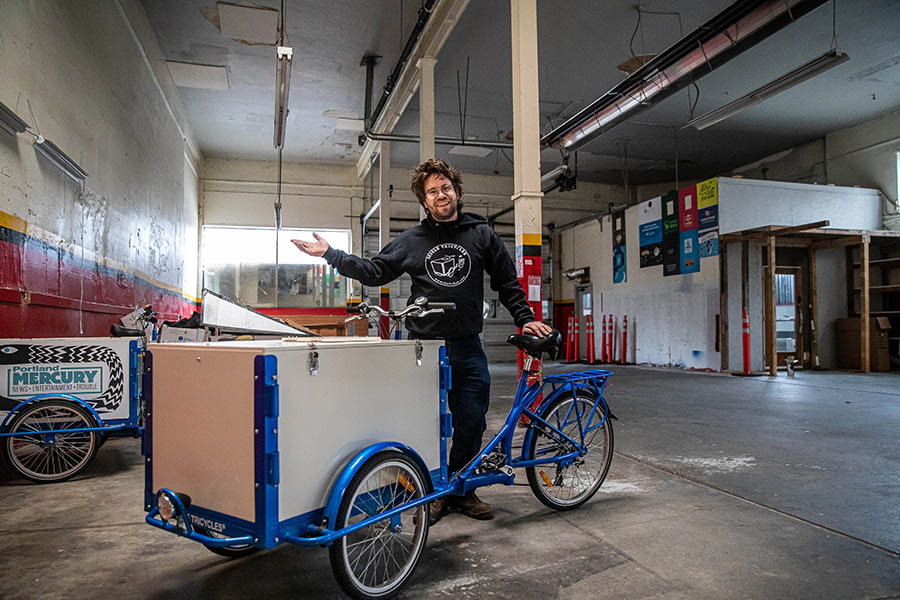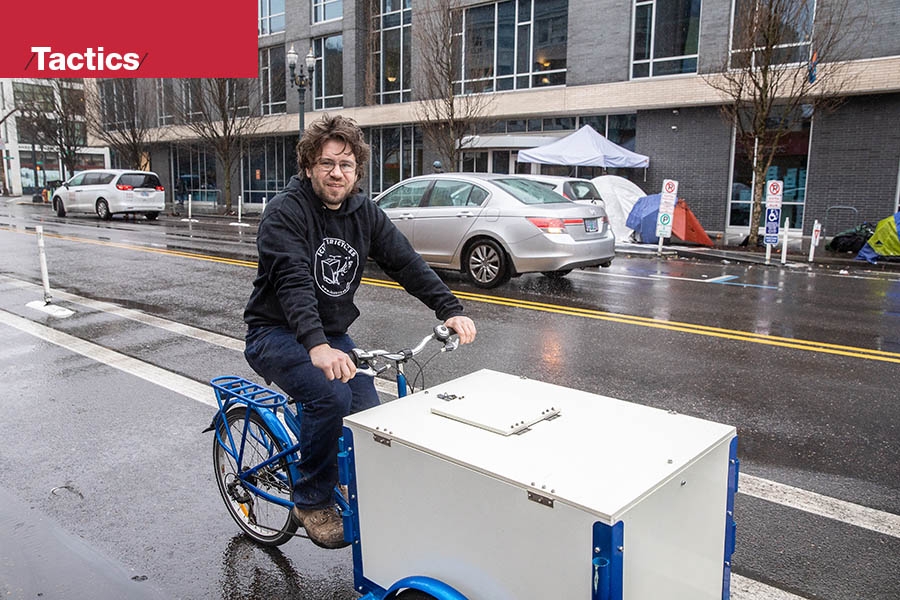Ryan Hashagen makes cool-as-ice trikes in Portland’s Old Town
Ryan Hashagen started Icicle Tricycles in 1999, while still in high school. He conceived the business as a new way to engage with both public space and transportation. It was also a continuation of a family tradition, he says, dating back to the 1930s, when his great-uncle served as a bike courier in Salem.
Icicle Tricycles started as a service-oriented company, selling things like ice cream and flowers and delivering The Portland Mercury before the newspaper ceased print publication — but rapidly expanded to a manufacturing business. The company has made trikes for companies as large as Campbell’s Soup, the Dallas Cowboys and Coca-Cola, and for smaller, local organizations like the Portland Business Alliance and Umpqua Bank. The company employs an average of about 10 people at three locations in Portland: two in Old Town and one in the central east side — and an office in Victoria, B.C.
Oregon Business spoke to Hashagen about the beginning of the business, the effects of the COVID-19 pandemic and plans for the future.
This interview has been edited for length and clarity.
How did you getting into building trikes?
The first place that I peddled an ice cream bike was up in the Yukon, of all places — in Whitehorse. Then I started fixing up an old rickshaw and essentially was able to put a cooler box on it to sell ice cream and flowers. As we started refining our process, we were having people contact us from all over that were saying, “Hey, I want to buy one of your trikes.” And I was saying, “Well, no, I’m too busy selling ice cream right now, you know. Wait until October, November.” Ultimately, we had customers that did call us back and we started building trikes. Some of the first customers we served were Cirque du Soleil, Umpqua Bank, Voodoo Doughnut, the Portland Business Alliance. The national ones we did initially were El Jimador Tequila, Odwalla, Heineken, Whole Foods, Evian — all sorts.
What’s next?
We are really continuing to help our small-business customers, you know, with their business development and planning. We have some new models we’re going to be unveiling. I can’t release what those are, but we love the new models we’re working on. Our Canadian expansion has gone well over the last few years. We have an office location in Victoria, B.C., to help Canadian customers not have to pay customs brokerage. We are constantly trying to lessen our turnaround times and provide a wider range of options at different price points and levels of customization.
What’s the customer relationship like? I imagine that with a product like this, maintenance is maybe going to be a little bit different. You’ve got customers all over the country. Are these products that they can take to their local bike shop if there’s an issue?
We’ve actually designed the trike to be as easy to maintain as possible using standardized bike componentry so that any local bike shop can work on it. But we also ship the trikes fully built and with full quality control. We’re a bit of an artisanal trike manufacturer, and we’re doing all the levels of customization. We’re shipping it to them fully ready to roll. We are slowly moving toward more of an e-commerce approach, but we are thoroughly still in the camp of us answering emails and phone calls, and really providing a hands-on approach to customer service, while also building tricycles that are going to be the easiest to maintain and pedal and utilize for a small business.
 Ryan Hashagen, owner and founder of Icicle Tricycles. Photo: Jason E. Kaplan
Ryan Hashagen, owner and founder of Icicle Tricycles. Photo: Jason E. Kaplan
What does a customer like Marriott use a cargo tricycle for?
So my original kind of inspiration for the business was, I was in high school trying to figure out ways that we can look at mobility in the future and look at our public spaces in a different way. And I saw some folks using bike activism in confrontational ways. I realized that tricycles — being how cute they are, and how engaging they are — that it really lowers barriers to engagement. It allows people to re-envision how we can interact in public spaces. We are not really inventing any of these ideas, we’re just bringing a new life to it.
As to why it’s a value to a national corporation to have a tricycle, it’s an amazing platform to be able to interact with people. We made an allergy-app tricycle for New York this summer. We wheeled it out here in Old Town to take photos of it on the street like we do for every trike. We had a dozen people come up within a few minutes and say, “What is an allergy app? And why is it on a tricycle?” It’s just that excuse to enter, engage. I can pedal my bike around town and you maybe get smiles here or there — but you pedal a trike around and it just lightens up people’s days. It’s just so cute, and it’s so intriguing. We build our trikes as mini billboards, and mini retail pop-up shops. If someone wants to hand out goods, do product sampling, someone wants to do product engagement, someone wants to hand out coupons for a Pier 1 store in Long Beach — whatever they want, our trikes are incredibly versatile. We’ve just built one for the back lot of a major television studio, which is going to be using it for employee appreciation. We have library trikes, we have trikes for park maintenance. There’s a multitude of uses. As we move toward a decarbonized future, tricycles are going to play a role in how business is done.
So delivery is really just part of the value that companies see.
Delivery might not even be a large sector for us. It’s going to be a pop-up retail shop, it’s going to be delivery, it’s going to be product engagement. The other thing I’m going to share is, oh, I don’t know, a decade ago, I did a trip by public transit from Portland to Chile — all over land. Along the way, I met thousands of tricyclists, people running their small businesses — whether that’s them gathering scrap metal or running a taxi service. The precedent is all over the world; tricycles are used as a platform. We are more the aberration than not versus other countries in the Americas.
I’ve heard from people who run bike shops that there was a period [early in the pandemic] where everybody was excited about buying bikes, and just engaging in more outdoor recreation. And there were supply-chain issues with parts because there are certain bicycle components that a lot of U.S. bike manufacturers outsource from other countries. Has that been an issue for you?
We have a different customer base than most bike shops. At the same time that everyone was wanting to go pedal around and have a recreational bike for their work-from-home [situation], that was probably one of our quietest periods. As we’ve seen a move to social distancing and social-distance serving, we have had our trikes be in demand for those purposes. And we, like everyone, have had challenges with supply-chain issues. We try to be well stocked on inventory of parts. But saddles have been an issue at one point, brake-cable housing was an issue at one point. And we’re just trying to navigate this the best we can.
To subscribe to Oregon Business, click here.






